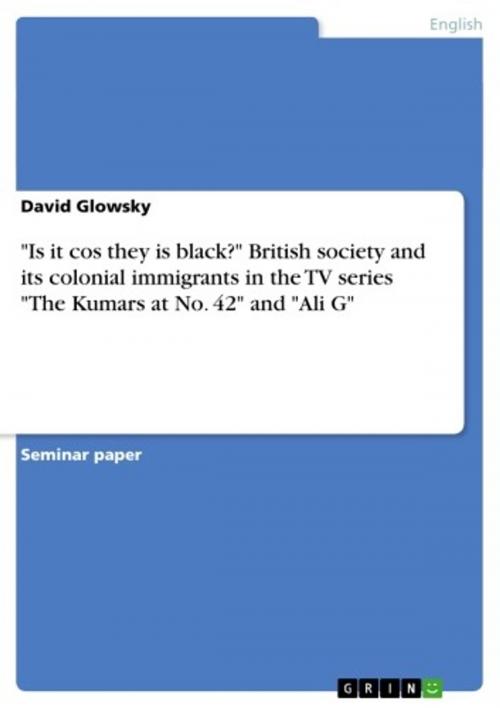'Is it cos they is black?' British society and its colonial immigrants in the TV series 'The Kumars at No. 42' and 'Ali G'
Fiction & Literature, Literary Theory & Criticism, British| Author: | David Glowsky | ISBN: | 9783638251143 |
| Publisher: | GRIN Publishing | Publication: | February 5, 2004 |
| Imprint: | GRIN Publishing | Language: | English |
| Author: | David Glowsky |
| ISBN: | 9783638251143 |
| Publisher: | GRIN Publishing |
| Publication: | February 5, 2004 |
| Imprint: | GRIN Publishing |
| Language: | English |
Seminar paper from the year 2003 in the subject English Language and Literature Studies - Literature, grade: 1,0 (A), University of Leipzig (Institute for Anglistics), course: Novels of the Indian Diaspora, 28 entries in the bibliography, language: English, abstract: British society has undergone a considerable change of its composition in the past fifty years. Unprecedented numbers of immigrants came to Great Britain after World War II. The traditional populatio n, which had been rather homogeneous until then, was confronted with foreign-looking people who came from former colonies and whose identities seemed anything but British. Since then, the proportion of non-white Britons of the population has risen steadily. Their influx was increasingly made difficult, when the voices against such immigrants grew stronger. The national self-image of a white British nation became more and more problematic. At present British self-understanding is undergoing a shift away from the traditional viewpoint to an awareness of changed circumstances. In this setting the essay at hand will investigate signs of that shift in two British TV series formats, namely 'The Kumars at No. 42' and 'Ali G'. It will show how remaining tensions between the immigrant and the traditional population are being dealt with and how new ways of coexistence are negotiated. The main focus will be an analysis of strategies to break down old imperial structures and sublime ways to question British selfimages. Both TV series have their own ways of turning the imperial tables and presenting British society in a critical light. The essay is divided into two parts. In the first section, an overview of British immigration history since 1945, followed by a discussion of British national sentiment will be given. The second section analyses the strategies of the two series against this backdrop.
Seminar paper from the year 2003 in the subject English Language and Literature Studies - Literature, grade: 1,0 (A), University of Leipzig (Institute for Anglistics), course: Novels of the Indian Diaspora, 28 entries in the bibliography, language: English, abstract: British society has undergone a considerable change of its composition in the past fifty years. Unprecedented numbers of immigrants came to Great Britain after World War II. The traditional populatio n, which had been rather homogeneous until then, was confronted with foreign-looking people who came from former colonies and whose identities seemed anything but British. Since then, the proportion of non-white Britons of the population has risen steadily. Their influx was increasingly made difficult, when the voices against such immigrants grew stronger. The national self-image of a white British nation became more and more problematic. At present British self-understanding is undergoing a shift away from the traditional viewpoint to an awareness of changed circumstances. In this setting the essay at hand will investigate signs of that shift in two British TV series formats, namely 'The Kumars at No. 42' and 'Ali G'. It will show how remaining tensions between the immigrant and the traditional population are being dealt with and how new ways of coexistence are negotiated. The main focus will be an analysis of strategies to break down old imperial structures and sublime ways to question British selfimages. Both TV series have their own ways of turning the imperial tables and presenting British society in a critical light. The essay is divided into two parts. In the first section, an overview of British immigration history since 1945, followed by a discussion of British national sentiment will be given. The second section analyses the strategies of the two series against this backdrop.















